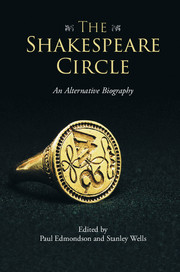Book contents
- Frontmatter
- Contents
- List of illustrations
- List of contributors
- Preface and acknowledgements
- General introduction
- Part I Family
- Part II Friends and Neighbours
- Part III Colleagues and Patrons
- 18 His fellow dramatists and early collaborators
- 19 His theatre friends: the Burbages
- 20 His fellow actors Will Kemp, Robert Armin and other members of the Lord Chamberlain's Men and the King's Men
- 21 His literary patrons
- 22 His collaborator George Wilkins
- 23 His collaborator Thomas Middleton
- 24 His collaborator John Fletcher
- 25 His editors John Heminges and Henry Condell
- Closing remarks
- Afterword
- Index
- References
19 - His theatre friends: the Burbages
from Part III - Colleagues and Patrons
Published online by Cambridge University Press: 05 November 2015
- Frontmatter
- Contents
- List of illustrations
- List of contributors
- Preface and acknowledgements
- General introduction
- Part I Family
- Part II Friends and Neighbours
- Part III Colleagues and Patrons
- 18 His fellow dramatists and early collaborators
- 19 His theatre friends: the Burbages
- 20 His fellow actors Will Kemp, Robert Armin and other members of the Lord Chamberlain's Men and the King's Men
- 21 His literary patrons
- 22 His collaborator George Wilkins
- 23 His collaborator Thomas Middleton
- 24 His collaborator John Fletcher
- 25 His editors John Heminges and Henry Condell
- Closing remarks
- Afterword
- Index
- References
Summary
The Burbage family dominated theatrical enterprise in London for three-quarters of a century. Shakespeare appears to have entered their larger family of colleagues and collaborators in the early 1590s, and remained a friend until his death in 1616, or for roughly a third of the Burbages’ career of management and entrepreneurship, spread over three generations. The men of the family predominate in standard histories of the stage – James, the father, and his two sons Cuthbert and Richard – but women were equally significant in the family enterprise, particularly James's wife Ellen (née Brayne), who lived until 1613, and Richard's wife Winifred (née Turner), who remained a shareholder in the family's theatre properties practically until the parliamentary closing of the theatres in 1642. For more than sixty years the Burbages lived in Shoreditch, a region of the northern London suburbs with a rich theatrical culture, examined at more length in what follows.
Both James and Richard were actors, as Cuthbert never was, the younger son eclipsing the father in fame and skill, and acting until the very end of his life; Richard Burbage died, probably quite suddenly, at the age of fifty, three years after the death of his colleague and collaborator Shakespeare. His brother later wrote that he had a thirty-five-year career on the stage. It was Richard whom Shakespeare would have seen and talked to practically daily for roughly twenty years, the talented interpreter of all his major parts, from Richard III to Prospero. His face, voice, physique and gesture were familiar to many, from the monarchs Elizabeth and James to the lowliest regular playgoers at the Globe. He died in March 1619 shortly after the death of King James's wife Queen Anne, and mourning for him is said to have overshadowed that for her. If we think of him now as the first truly great English tragic actor, in the line of Betterton, Garrick and Kean, contemporary praise hailed him, as it did his great coeval Edward Alleyn, as a ‘delightful Proteus’, capable of considerable range and versatility. As a leading member of a repertory company Burbage would have taken larger parts in all the plays they staged, including Shakespeare's and Jonson's comedies.
- Type
- Chapter
- Information
- The Shakespeare CircleAn Alternative Biography, pp. 248 - 260Publisher: Cambridge University PressPrint publication year: 2015

